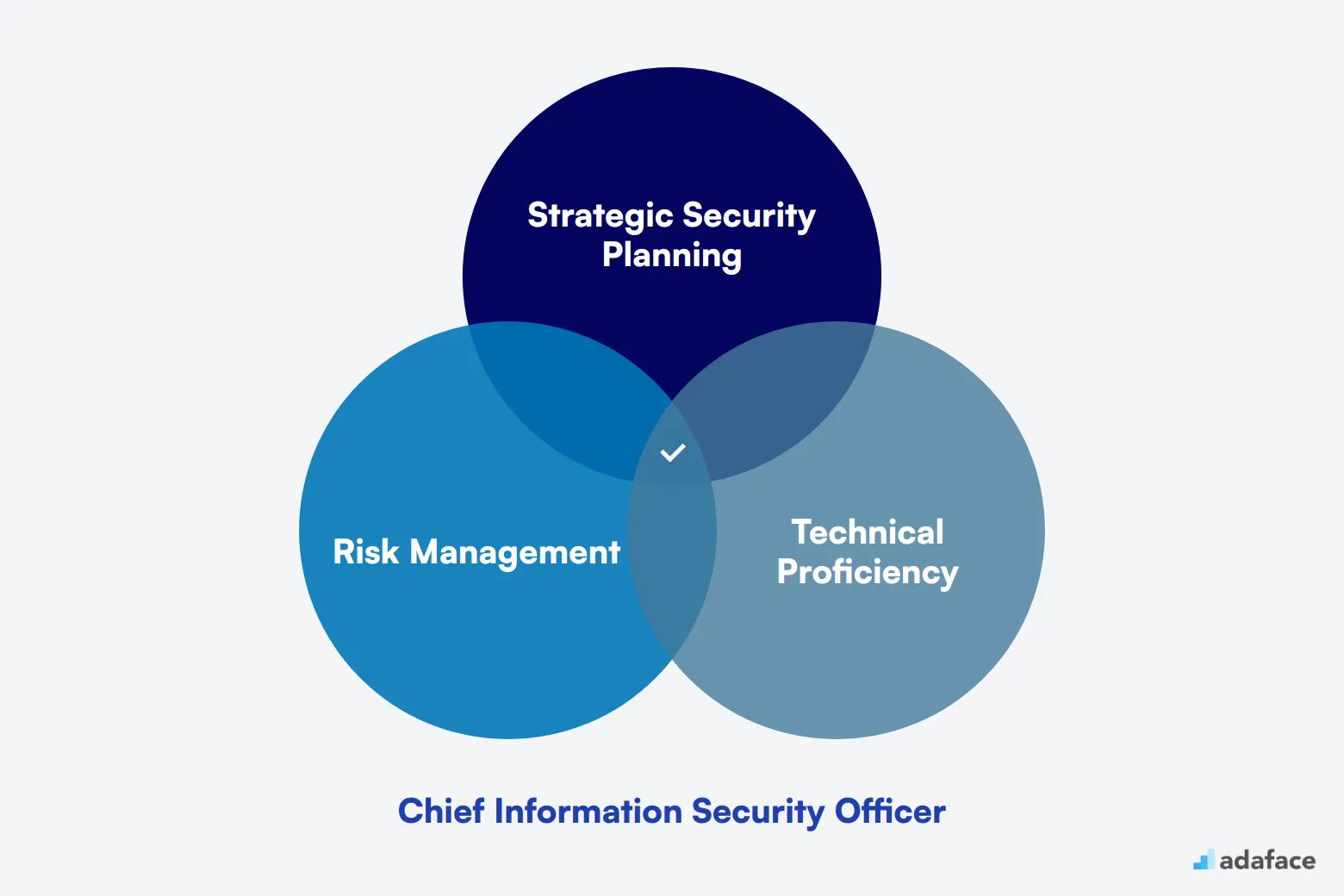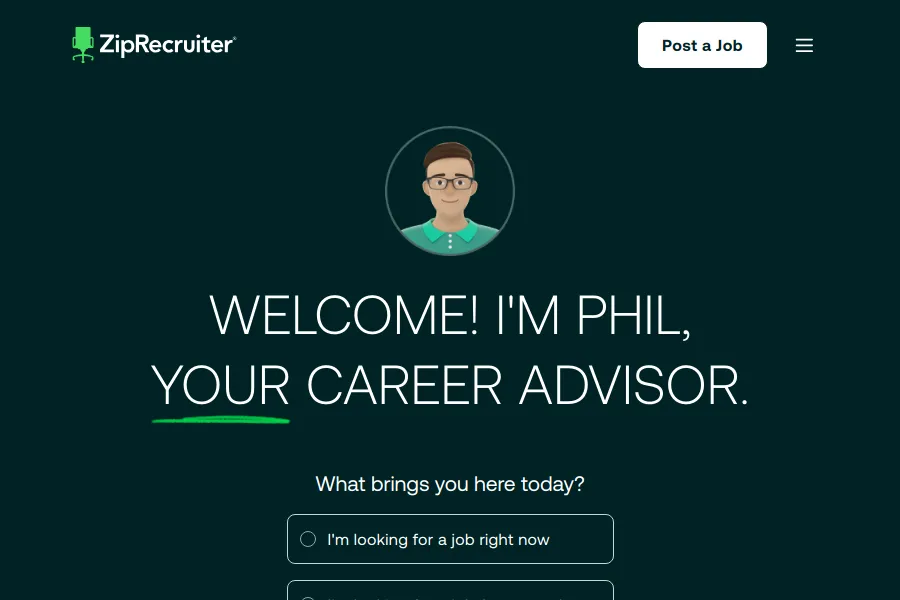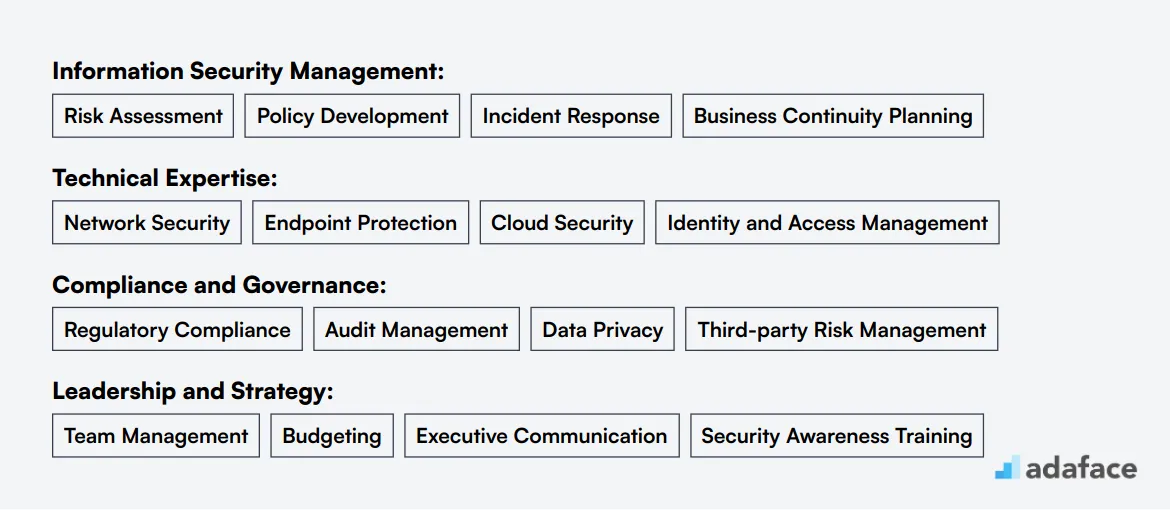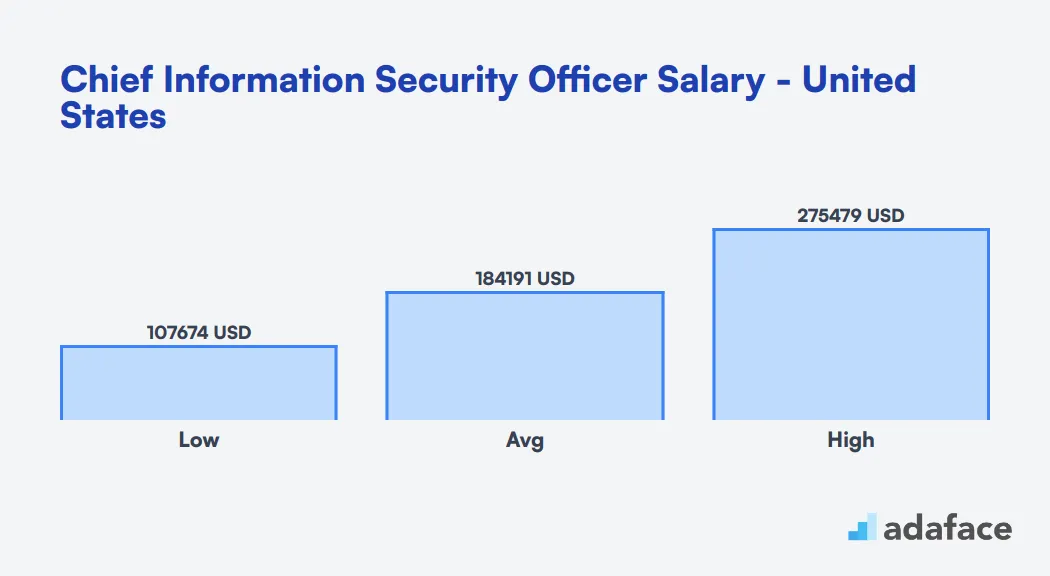In today's digital landscape, hiring a Chief Information Security Officer (CISO) is critical for safeguarding your organization’s sensitive information. As a recruiter or hiring manager, you need to identify candidates with not just technical expertise but also strategic vision. Many companies fall short by focusing solely on technical skills, overlooking the broader business acumen that a CISO needs to effectively manage risk and align security initiatives with business objectives.
This article guides you through everything you need to know about recruiting a CISO. From crafting the perfect job description to structuring interviews, we equip you with insights and resources to make informed hiring decisions. To enhance your recruitment process, consider exploring our information security resources.
Table of contents
Why Hire a Chief Information Security Officer?
A Chief Information Security Officer (CISO) is becoming increasingly necessary for organizations facing growing cyber threats. To determine if you need a CISO, start by identifying your current security challenges. For example, you might be struggling with data breaches, compliance issues, or a lack of cohesive security strategy across departments.
Consider these common scenarios where a CISO can add value:
- Developing and implementing a company-wide information security program
- Managing security risks and ensuring regulatory compliance
- Responding to and mitigating cyber incidents
If your organization handles sensitive data, operates in a regulated industry, or has experienced security incidents, it's time to consider hiring a full-time CISO. For smaller companies or those just starting to prioritize cybersecurity, working with a consultant or fractional CISO might be a good first step.

Key Skills and Qualifications for a Chief Information Security Officer
Hiring a Chief Information Security Officer (CISO) can be challenging, as the role demands a blend of skills that may vary greatly between organizations. It's easy to misjudge what is required versus what is merely preferred, leading to potential mismatches in candidate profiles.
To set the right expectations, it’s important to clearly differentiate between required skills and qualifications, which are non-negotiable, and preferred skills, which can enhance a candidate's profile. Below is a detailed overview of what to look for when hiring a CISO.
| Required skills and qualifications | Preferred skills and qualifications |
|---|---|
| 10+ years of experience in information security | Master's degree in Cybersecurity or related field |
| Bachelor's degree in Computer Science, Information Technology, or related field | Industry certifications (e.g., CISSP, CISM) |
| Strong knowledge of cybersecurity frameworks (e.g., NIST, ISO 27001) | Experience in a regulated industry (e.g., finance, healthcare) |
| Experience in risk management and compliance | Knowledge of cloud security principles |
| Proven leadership and team management skills | Strong communication and presentation skills |
How to Write an Effective Chief Information Security Officer Job Description
Once you've identified the ideal candidate profile for your CISO role, the next step is crafting a compelling job description to attract top talent. Here are some key tips to make your CISO job posting stand out:
• Highlight strategic responsibilities: Emphasize the CISO's role in shaping cybersecurity strategy, managing risk, and protecting critical assets. Mention specific duties like developing security policies, overseeing incident response, and collaborating with executive leadership.
• Balance technical and leadership skills: While technical expertise is important, don't forget to highlight leadership qualities. Include requirements for both hard skills (e.g., knowledge of security frameworks, certifications like CISSP) and soft skills (e.g., communication, team management, stakeholder engagement).
• Showcase your company's commitment: Highlight your organization's dedication to cybersecurity and the resources available to the CISO. This could include information about your security team, technology stack, or ongoing initiatives. You can reference a detailed Chief Information Security Officer job description for more ideas on what to include.
• Emphasize growth opportunities: Attract ambitious candidates by mentioning possibilities for professional development, impact on the organization, and potential for career advancement within your company.
Top Platforms for Hiring a Chief Information Security Officer
Now that you have crafted a strong job description for a Chief Information Security Officer (CISO), it's time to list the position on job platforms to attract top talent. Choosing the right platforms ensures that your job posting reaches the most relevant candidates, saving time and resources.
LinkedIn is a professional networking site widely used for full-time roles, including executive positions like CISO.

Indeed
Indeed is a popular job board for listing full-time positions across various industries, suitable for reaching a wide audience.

ZipRecruiter
ZipRecruiter allows for posting detailed job descriptions and reaches a broad user base, ideal for full-time hires.

For the remaining platforms, consider CyberSecJobs for specialized cybersecurity roles, and FlexJobs if you're hiring for remote or flexible positions. Upwork is a great choice for contract-based or freelance CISO roles, while Dice is excellent for targeting technology-focused candidates. For executive searches, ExecuNet is highly recommended. If you're a startup, AngelList provides a dynamic environment for finding executive roles. Finally, RemoteTechJobs focuses on remote technology roles, perfect for remote CISOs. For more guidance on the hiring process, explore our blog on how to conduct an interview.
How to Screen Chief Information Security Officer Resumes
When you're hiring a Chief Information Security Officer (CISO), resume screening becomes an important step to sift through the numerous applications. This process helps you narrow down candidates who align with the core requirements of the role, ensuring that only the most suitable candidates move forward in the hiring process.

Knowing what keywords to look for can streamline manual screening. For a CISO, keep an eye out for keywords such as "strategic security planning," "risk management," and "technical proficiency." You should also prioritize candidates with over 10 years of experience in information security and those with strong knowledge of cybersecurity frameworks like NIST or ISO 27001.
AI tools can also aid in screening resumes by automating the search for specific keywords. Using AI models, recruiters can input prompts to flag resumes that list key qualifications and skills relevant to the CISO role, such as leadership and risk management experience. For tips on conducting interviews, you can refer to how-to-conduct-an-interview.
Here's an example prompt for AI tools to screen resumes for a CISO role:
TASK: Screen resumes to match job description for Chief Information Security Officer role
INPUT: Resumes
OUTPUT: For each resume, provide following information:
- Email ID
- Name
- Matching keywords
- Score (out of 10 based on keywords matched)
- Recommendation (detailed recommendation of whether to shortlist this candidate or not)
- Shortlist (Yes, No, or Maybe)
RULES:
- If unsure about a candidate's fit, categorize them as Maybe instead of No
- Keep recommendation concise and direct.
KEYWORDS DATA:
- Risk Management, Cybersecurity Frameworks, Team Management
- Industry Certifications (CISSP, CISM)
- Experience in Regulated Industries
Recommended skills tests for assessing Chief Information Security Officers
Skills tests are a great way to evaluate CISO candidates beyond their resumes. They provide objective insights into a candidate's technical abilities and problem-solving skills. Here are five key tests we recommend for assessing potential Chief Information Security Officers:
Cyber Security Test: This test evaluates a candidate's knowledge of information security principles, risk management, and threat detection. It's fundamental for assessing a CISO's core competencies.
Ethical Hacking Test: A CISO should understand offensive security techniques to better defend against them. This test assesses a candidate's ability to identify and exploit vulnerabilities ethically.
Cloud Computing Test: With many organizations moving to the cloud, CISOs need to understand cloud security. This test evaluates knowledge of cloud platforms, security controls, and best practices.
Network Engineer Test: A strong grasp of networking principles is key for CISOs. This test assesses understanding of network architectures, protocols, and security measures.
IT Tests: General IT knowledge is important for CISOs to communicate effectively with technical teams. These tests cover a range of IT topics relevant to the role.
Case Study Assignments for Hiring Chief Information Security Officers
Case study assignments can be valuable tools for assessing CISO candidates, but they come with drawbacks. They're often time-consuming, which can lead to lower completion rates and potentially losing strong candidates. However, when used judiciously, they can provide deep insights into a candidate's problem-solving skills and strategic thinking.
Security Breach Response: This case study presents a scenario of a major data breach in a fictional company. Candidates must outline their immediate response plan, long-term security strategy, and communication approach with stakeholders. This assignment tests their crisis management skills and ability to balance technical and business aspects of cybersecurity.
Security Policy Overhaul: Candidates are tasked with reviewing and updating an outdated security policy for a growing organization. They need to identify gaps, propose new policies, and create an implementation plan. This case study evaluates their policy-making abilities and understanding of evolving security landscapes.
Cloud Migration Security Strategy: This assignment involves developing a security strategy for a company transitioning from on-premises infrastructure to cloud services. Candidates must address risk assessment, compliance issues, and security controls specific to cloud environments. It tests their knowledge of cloud security and ability to adapt security measures to new technologies.
Structuring the Interview Stage for CISO Candidates
After candidates pass the initial skills tests, it's crucial to conduct thorough technical interviews. These interviews help assess a candidate's hard skills in real-world scenarios, which may not be fully captured by standardized tests. Let's explore some key questions to ask during the CISO interview process.
Consider asking: 'How would you develop and implement a company-wide cybersecurity strategy?' This gauges strategic thinking. 'Describe a time you handled a major security breach.' This reveals crisis management skills. 'What metrics do you use to measure the effectiveness of security programs?' This shows analytical abilities. 'How do you stay updated with the latest security threats and technologies?' This indicates continuous learning. 'How would you balance security needs with business objectives?' This assesses business acumen. These questions help evaluate a CISO candidate's technical expertise and leadership potential.
How much does it cost to hire a Chief Information Security Officer?
The cost of hiring a Chief Information Security Officer (CISO) can vary widely depending on the location and the specific market conditions. In the United States, the average salary is around $184,192, but this can go as high as $469,066 in San Francisco or $271,344 in New York. Recruiters should be mindful of these variations to offer competitive packages.
Chief Information Security Officer Salary in the United States
The average salary for a Chief Information Security Officer (CISO) in the United States is approximately $184,192. Salaries can vary significantly based on location; for instance, in San Francisco, CA, salaries can reach up to $469,066, while in New York, NY, the maximum can be around $271,344. It's important for recruiters to consider these variances when setting a compensation package.

What's the difference between a Chief Information Security Officer (CISO) and a Chief Information Officer (CIO)?
While the roles of Chief Information Security Officer (CISO) and Chief Information Officer (CIO) are often intertwined, they have distinct responsibilities which can lead to confusion, especially for those new to the tech industry. Both roles are crucial for a company's success in managing technology and information, yet their areas of focus and expertise differ significantly.
The CISO primarily focuses on security and risk management. They are responsible for developing cybersecurity policies, managing incident responses, and ensuring compliance. A deep knowledge of security measures is a must, and they often report to either the CIO or the CEO. Their budget is specifically focused on security needs, and they typically hold certifications such as CISSP, CISM, or CEH.
In contrast, the CIO takes a broader view, overseeing the overall IT strategy and operations. Their key responsibilities involve managing IT infrastructure, guiding digital transformation, and integrating new technologies. The CIO generally reports directly to the CEO and manages the entire IT budget. They need broad IT knowledge and may hold certifications like CGEIT, ITIL, or PMP.
For more insights on the skills required for these positions, you might find this article useful.
| Chief Information Security Officer (CISO) | Chief Information Officer (CIO) | |
|---|---|---|
| Primary Focus | Security and risk management | Overall IT strategy and operations |
| Reporting Structure | Often reports to CIO or CEO | Typically reports to CEO |
| Key Responsibilities | Cybersecurity policies, incident response, compliance | IT infrastructure, digital transformation, technology integration |
| Technical Expertise | Deep security knowledge | Broad IT knowledge |
| Budget Control | Security-specific budget | Overall IT budget |
| Certifications | CISSP, CISM, CEH | CGEIT, ITIL, PMP |
| Risk Management Approach | Security-centric risk assessment | Business-aligned risk management |
| Stakeholder Engagement | Security awareness across organization | Business strategy alignment with executives |
What are the ranks of Chief Information Security Officers?
Understanding the hierarchy of Chief Information Security Officers (CISOs) can be tricky, especially since the role is often confused with other senior IT positions. However, knowing the ranks helps in identifying the right fit during the hiring process.
- Chief Information Security Officer (CISO): The CISO is the top executive responsible for the organization's information and data security. They oversee the security team, develop strategies to protect against cyber threats, and ensure compliance with regulations. The role requires significant experience in security management and leadership.
- Deputy Chief Information Security Officer: This role acts as the second-in-command to the CISO. They assist in the development and implementation of security policies and may focus on specific areas such as incident response or compliance. The deputy often steps into the CISO role when needed.
- Senior Information Security Manager: Positioned below the CISO and deputy, this role manages day-to-day security operations and coordinates between the security team and other departments. They ensure that security measures align with the strategic goals set by the CISO.
- Information Security Analyst: A more hands-on role, the analyst monitors networks and systems for security breaches, investigates incidents, and assists in the formulation of security policies. They provide crucial support to the higher ranks in maintaining the organization's security posture.
For those interested in the specific responsibilities and skills required for the CISO role, you can explore the Chief Information Security Officer job description.
Hire the Best Chief Information Security Officers
In this blog post, we have discussed the importance of hiring a Chief Information Security Officer (CISO), the key skills and qualifications they should possess, and the steps involved in writing an effective job description. We also explored how to screen resumes and provided insights into structuring the interview process to identify the right candidate.
If there's one takeaway from this guide, it's the importance of crafting clear job descriptions and utilizing skills assessments to ensure the right hire. Implementing targeted assessments can significantly improve hiring accuracy. Consider incorporating tests like the cyber security assessment to evaluate technical competencies effectively.
Cyber Security Assessment Test
FAQs
A Chief Information Security Officer is responsible for developing and implementing an organization's information security strategy, managing risks, and ensuring compliance with regulatory requirements.
A CISO candidate should have a strong background in information security, risk management, and compliance. They often hold degrees in computer science or related fields, along with certifications like CISSP or CISM.
An effective CISO job description should include key responsibilities, required qualifications, and desired attributes. It should clearly outline the role's strategic importance and align with your organization's specific needs.
Platforms like LinkedIn, specialized cybersecurity job boards, and recruitment agencies with a focus on tech and security roles are effective for hiring a CISO.
You can assess a CISO candidate's technical skills through skills tests, practical case studies, and interview questions focused on past experiences and problem-solving abilities.
During a CISO interview, focus on understanding the candidate's experience with risk management, their ability to align security with business strategy, and their leadership skills in building and managing security teams.
A CISO focuses on information security and risk management, while a CIO oversees the overall IT strategy and technology implementation in an organization.

40 min skill tests.
No trick questions.
Accurate shortlisting.
We make it easy for you to find the best candidates in your pipeline with a 40 min skills test.
Try for freeRelated posts
Free resources



